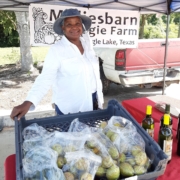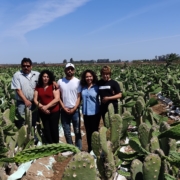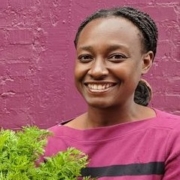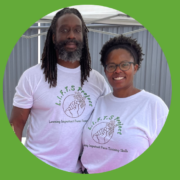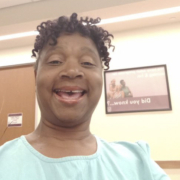Brandi Wallace
From a young age, Brandi Wallace of Hephzibah, Georgia, knew that she would be a farmer someday. Her initial introduction to farming was through FFA, and she recalls the experience with no fondness. As the only Black kid in the group, she stood out and found the experience to be unwelcoming. Brandi got her first chicken when she was 18 and quickly expanded to more than 100 animals. This led her to begin experimenting with a homesteading lifestyle, where she lived off the land, producing her own fruit, vegetables, and animal products. A chance encounter led her to host a petting zoo at a local farmers market, which quickly turned into a viable business.
As the petting zoo evolved, Brandi began producing eggs for sale and hosting classes on homesteading, butchering, and soap and cheese making. Brandi’s parents also own an 8-acre property that has been converted into a rentable farm that allows people the opportunity to dip their toes into the farming lifestyle.
As a Black woman in the farming community, she has encountered some shock and surprise that she has farm animals, let alone runs a fully operational farm. Some assume she is an assistant, not the farmer in charge. Community acceptance in this regard has been a challenge, particularly in the initial stages of meeting new people. As a person whose livelihood centers around educating the public, she finds herself needing to teach people that Black people can also be farmers.
Licensing has been another notable challenge. In a small town where everyone knows everyone, those in charge of licensing have posed unnecessary barriers to accessing the documentation she needs. “The same lady who sits at the license office…has recognized me at the petting zoo, and before I can even turn in my application, she’s already giving me the evil eye…and trying to [dissuade] me from filling out a license for anything that I am trying to do…She is always there wagging her finger, like, ‘I don’t think you should do this…I need more information.’ None of those questions she is asking me are on the application,” she explained.
Other organizations that serve farmers have fallen short by not having the staff necessary to serve the local community. “The only network that I have reached out to other than Growing Augusta would be the local Extension office. I find them to be so short-staffed that they can’t help [even] if they wanted to. If I call on a Monday, I’m not getting a call back until at least three weeks later. If I pop into the office, they’re always out.” It is a common theme that many farmers seem to face: the general lack of access to farming professionals.
After purchasing a new piece of land at an auction, she and her family experienced harassment and even threats from neighbors who were upset by the color of the new owners.
“When…I went on the property I was being harassed by some of the people who live in the area; some folks didn’t believe that I purchased the property. I was told that I was being watched. ‘It’s Klan country, and you’re being watched. Beware that they shoot near this property, and they don’t try to shoot people but sometimes accidents happen.’” Certain experiences and threats like these have led her to bring up issues to the county commissioner. Now, police patrol farmers markets to ensure that things run smoothly.
On the farm-management side, she has found bookkeeping to be a challenge, partly because the business began in an informal capacity and was able to survive as a cash business with no form of recordkeeping for quite some time. As Brandi learned, tax records are required in order to apply for certain benefits and programs. Now that she is able to hire additional staff for bookkeeping, she has been unable to find reliable staff.
Brandi’s farm has developed in a non-typical way, beginning as a personal project centered around love of animals and a desire to produce some of her own food. The farm has evolved through chance encounters with other supporters of local agriculture and adapting to the needs and requests of her community.
Along the way, Brandi has joined and participated in several helpful groups that that serve as a platform for her to provide support to others, as well as to access education and resources that help to support the future of her business.
Her resilience has served her well in getting through the challenges she from some in the community and others in public offices. An essential aspect of her success is her constant pursuit of education and her desire to get out into the community to teach and share. As a farmer, her income streams are varied and not what one would think of as typical farm products, but Brandi has been able to market her own skills to the community and grow to be successful in novel ways. Her reach into the community is meant not only to teach but also to inspire. The petting zoo has brought in many children who come in wanting to hold and pet the animals and leave knowing more about where their food comes from.





